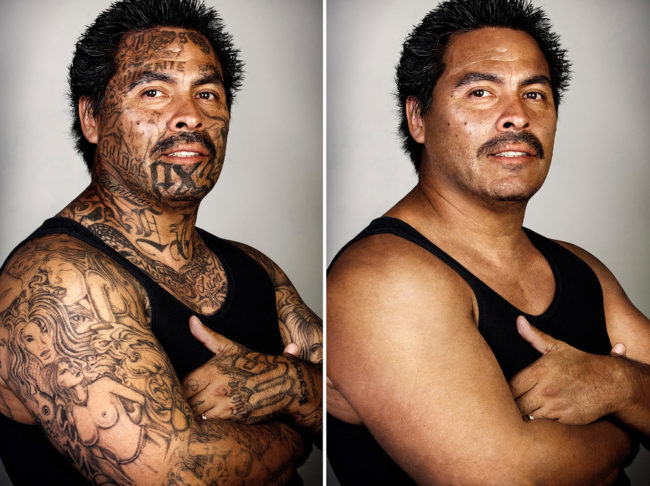
Marcos Luna, one of the subjects of Skin Deep: Looking Beyond the Tattoos.
In a unique endeavor – soon to be a book – photographer Steven Burton digitally erased the tattoos from portraits of ex-gang members to show what they would look like without the ink. And the results were amazing.
During the two-year project, Skin Deep: Looking Beyond the Tattoos, Burton photographed 26 men and one woman, removed their tattoos using Photoshop and then interviewed them about their lives and how they felt about being tattooed.
It all began when a friend invited Burton to the premier of G-Dog, the documentary about Father Greg Boyle, founder of Homeboy Industries. “I had just moved to L.A. and knew nothing about gangs, but I was totally overwhelmed by the movie,” he says.
What Burton noticed most was the number of tattoos that adorned the Homeboys’ bodies and how tattoo removal played an important role in the organization’s mission. “I thought, I could take tattoos off with Photoshop and see what happens,” he says.
Excited by the prospect, he produced some sample before-and-after photos and took them to Homeboy the next day to gauge interest. The people he showed them to were impressed, and Skin Deep was on its way.
Photoshopping photos took more than 400 hours
Over a period of six months Burton photographed Homeboy members and some of their friends. Each shoot lasted only about 10 minutes, but Burton spent more than 400 hours to Photoshop the tattoos off of all of his subjects.
He later went back to show the people he photographed their “before-and-after” photos and to interview them so he could include their stories in the book. That was the biggest challenge he faced during the entire project.
“The hardest thing about this book was finding the people I photographed when I returned to L.A. (He was there off and on during the two years.) Some of them had left Homeboy and changed their phone numbers,” he says.
It may have been difficult to find them, but that’s when the project became more meaningful to Burton.
“I take pictures of somebody I don’t know and get to know them through their interviews. And once you get to know someone, the tattoos become less intimidating,” he says.
How subjects see themselves without their tattoos
“But the most interesting part of this project for me is how they see themselves. At first I was so focused on how other people see them. But when they saw the pictures is when I realized it was a pretty powerful concept.”
These portraits, four in all for each subject – a headshot and a full body photo each with and without tattoos – are paired with an interview in the upcoming book.
The interviews, some as long as 2,000 words, introduce the ex-gang members as real people, and bring to life their dreams and ambitions.
“They’re fascinating, amazing interviews,” says Burton. “I was so much more interested in where they want to go in their lives and how they have changed than the crimes they committed, because that’s more relevant. The interviews are about their aspirations and hopes. They’re about what the tattoos mean to them, the challenges they face and how they deal with day-to-day life.”
And showing the photos to his subjects was also an incredible experience for Burton. Although he was concerned that his subjects would be depressed, that didn’t happen.
“There was sadness when they saw the pictures and amusement as well. It was a reflective experience,” he says. “Many things passed through their minds. They wondered if their chances in life would be different if they didn’t look like this. The tattoos reflect the life they’ve been through.”
Even before they were able to see themselves without tattoos, 90 percent of his subjects had already decided to get their tattoos removed. Two of the men in the book have since been shot and killed by the police.
powerHouse Books to release Skin Deep in October
Although he’d like to continue the project, possibly taking it to prisons, Burton will remain busy with his photography business and promoting the book, which will be released in October by powerHouse Books.
The experience taught him a great deal and made him reevaluate his first impressions of people who may, at first glance, look very different from others. And his tattooed subjects inspired him.
“I learned about the incredible courage it takes to change your life. If these people can do what they do, then we have no excuses. They come from a pretty abusive background, and to actually change themselves and find work is incredibly humbling,” he says. “But mainly, I learned that they’re human beings like everyone else.”
When published this fall, Skin Deep: Looking Beyond the Tattoos will be available on Burton’s website, and through powerHouse Books, Barnes & Noble and Amazon.

